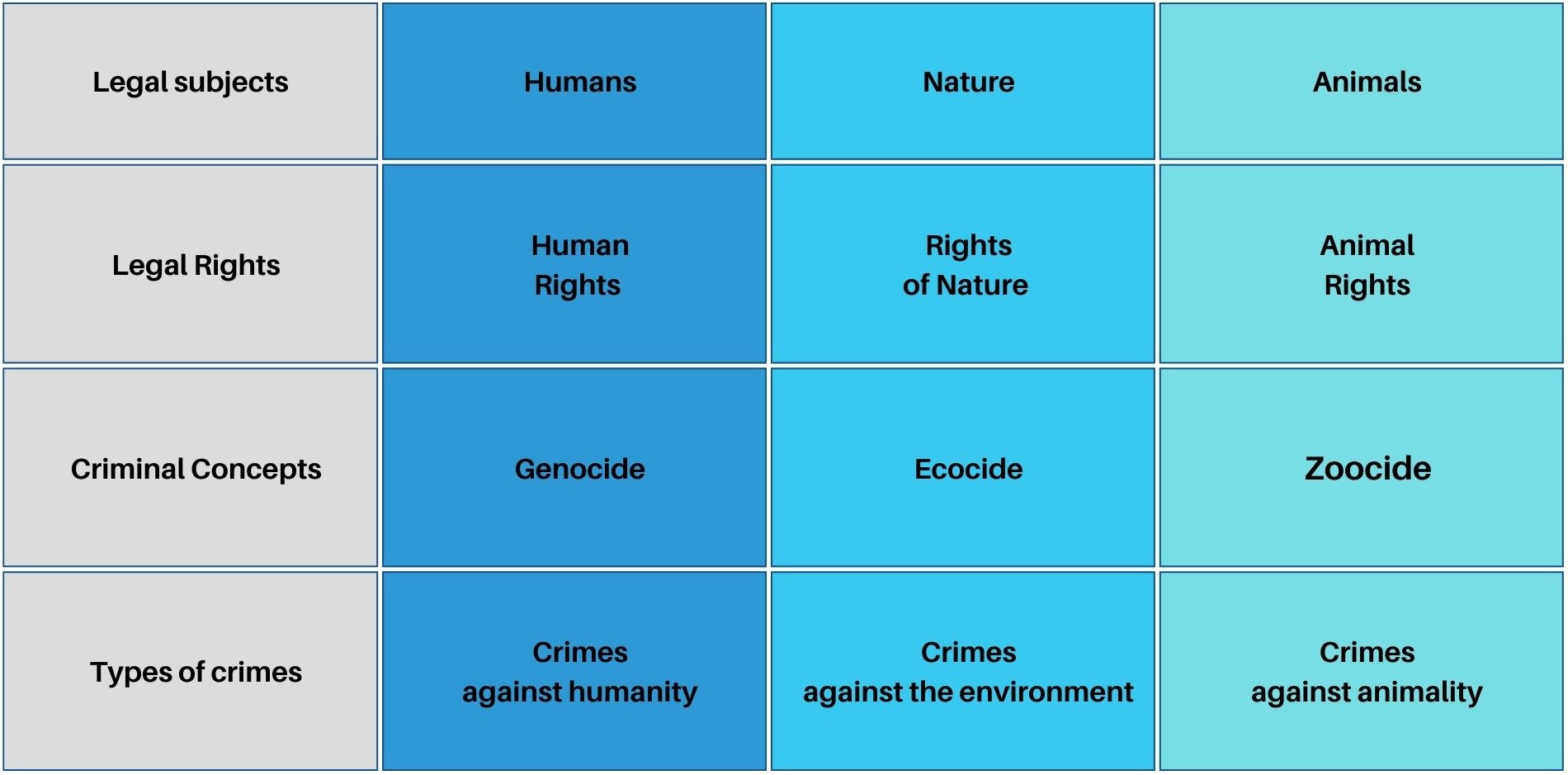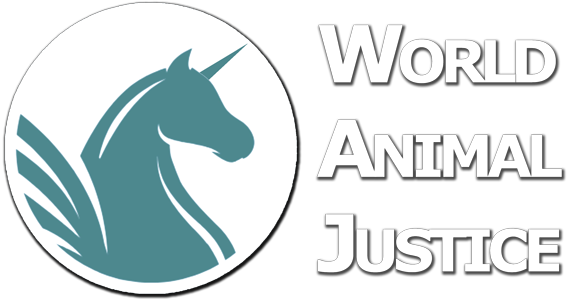All sentient animals deserve to be internationally protected by the law. World Animal Justice aims to create a new world of justice for all animals, where we protect animal’s fundamental rights to live, be free and well-treated,
and where massive animal crimes and zoocide belong to the past.
The author explored the connection between ecocide and zoocide in her paper To Really Stop Ecocide, We Need to Stop Zoocide. When we look to the legal developments in the human rights and environmental movements, a campaign against zoocide appears to be a logical next step.
- Human Rights are protected by laws against genocide and crimes against humanity.
- Rights of Nature are protected by a law against ecocide. Rights of Nature and Ecocide laws are becoming more common around the globe.
- Animal Rights would be protected by a law against crimes against animality, and against zoocide. This statement is first proposed by World Animal Justice as a pioneering NGO advocating for crimes against animality and zoocide to be recognized and prohibited in international law.

“World Animal Justice is advocating for law reforms against zoocide and crimes against animality[1], which can be prosecuted at the international criminal law level (at the current International Criminal Court or a new specific one). An international treaty against animal crimes in the broad sense and espcecially against zoocide is also promoted as a long term objective.
What is Genocide
Definition: ‘The systematic and widespread extermination or attempted extermination of a national, racial, religious, or ethnic group.’ Genocide became a crime in the wake of World War II. The Rome Statute of the International Criminal Court covers the jurisdiction of the court and which crimes can be prosecuted: Crimes against humanity and genocide are both crimes that can be prosecuted at the ICC.[2] The prevention of genocide is also covered by an international treaty: the Convention on the Prevention and Punishment of the Crime of Genocide (1948). The full definition of ‘Genocide’ can be found here.
What is Ecocide
Anyone interested in reading about what ecocide is and why it should be outlawed can learn more about it here and see the proposed legal definition here. There are laws against ecocide in several countries, and the campaign continues to lobby for it’s inclusion in the Rome Statute so that ecocide becomes an international crime which can be prosecuted at the ICC.
What is ‘Zoocide’
Etymology
- Zoocide comes from the prefix ‘zo-‘ the root word and prefix for animal in Greek, derived from the Greek “zōion” (ζῷον), meaning “animal” or “living being.”
- The suffix “-cide” comes from the Latin root “caedere,” meaning “to kill.” The second ‘o’ in ‘zoocide’ is a connector letter, like the o in ‘genocide.’
Pronunciation
- The author suggests an English pronunciation of ‘ZOH-oh-side,’ or ‘ZOH-uh-side’ similar to the two syllables found in ‘zoology.’ Other words with two syllables and the prefix Zo- include: zooid, zoonotic. This may help distinguish the term from the word ‘zoo,’ since zoocide applies to all animals, not just zoo animals.
Meaning
- The term zoocide is relatively new. One of it’s current meanings is a substance used to kill animals, like pesticides. We suggest a meaning aligned with genocide and ecocide: the systematic killing of animals.
- Buddhist monk and author Matthieu Ricard proposes using the term zoocide in cases where animals are systematically put to death in large numbers.[3] He suggests a five-point definition for an international convention on zoocide, which is adapted from the definition for genocide.
- a) Slaughter of members of an animal group;
- b) Serious attack on the physical or mental integrity of members of the group;
- c) Subjection of the group to painful conditions leading up to their systematic slaughter;
- d) Measures intended to encourage maximal number of births within the group with a view to subsequent slaughter;
- e) Forced separation of the offspring of the group from their parents.
Examples of Zoocide
- When we take the meaning ‘systematic killing of animals,’ it becomes clear that factory farming, industrial fishing, wildlife trafficking, and any form of systematic killing of farmed or wild animals, are forms of zoocide.
Zoocide as a Form of Ecocide
Since industrial animal agriculture of terrestrial and aquatic animals are major contributors to ecocide, there is an argument to be made that in order to really stop ecocide, we also need to stop zoocide.
Since animals are part of the environment, one can also argue that the systematic killing of animals—zoocide— is a form of ecocide. However, where animal killing is legal it would not be possible to prosecute someone for ecocide, because ecocide only applies to actions that are illegal. See To Really Stop Ecocide, We Need to Stop Zoocide for an analysis of how to prosecute actors for causing ecocide where mass numbers of animals are killed.
Animal rights campaigners should lobby their governments to include examples of animal killing when implementing a law against ecocide. Following my analysis, the following may be included as examples of ecocide:
- Illegal hunting (such as of endangered species) and wildlife trafficking;
- Illegal, unreported, and unregulated fishing (IUU fishing);
- Illegal fertiliser and pesticide overuse.
- Overcrowding of livestock leading to a risk of bird or pig flu outbreak;
- Illegal antibiotic overuse in livestock;
- Illegal welfare violations leading to mass deaths of farmed fish due to lice infestation, or farmed animals due to illness on-farm.
The above examples would help make it possible to challenge animal exploitation industries.
Why Campaign Against Zoocide?
Why do we need another word to describe the systematic killing of animals? Daryll Robinson writes: “the argument in favour of ‘ecocide’ is that it is striking: it is the proposed crime of ‘ecocide’ that has stirred public and political interest and passion, whereas anodyne labels have not. The expressive function of a label is a legitimate consideration; an important function of criminal law is ‘message’.27 Not so long ago, the terms ‘war crimes’, ‘crime against humanity’ and ‘genocide’ were all new and were criticized for their novelty, but they were adopted because they help galvanize public understanding and support.28″
Deborah Cao’s ‘crimes against animality,’ and Ricard’s ‘zoocide’ are also striking and expressive, like their counterparts in environmental and human rights law, making both terms appropriate to use in a campaign, as well as in international law.
[1] Deborah Cao, ‘Crimes against animality: animal cruelty and criminal justice in a globalized world’ Bruce A Arrigo and Heather Y Bersot (eds), The Routledge Handbook of International Crime and Justice Studies (Routledge 2014).
[2] https://www.icc-cpi.int/sites/default/files/2024-05/Rome-Statute-eng.pdf
[3] Matthieu Ricard, A Plea for the Animals, (Shambala Publications 2016) Ch 7.


